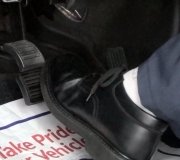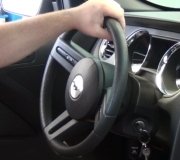Dandy. My guess, based partly on mileage, but mainly on age, is the master cylinder has been damaged. Depending on the design of the reservoir, you may be able to find a clue that proves if I am right. When you just start pushing the brake pedal, brake fluid is pushed out of the two "replenishing" ports, also called the return ports. That fluid will squirt up and splash onto the reservoir cap, or if you are really aggressive, it can actually splash onto the bottom of the hood. Once the pedal is pushed far enough that the lip seals have passed those ports, the fluid is trapped and no more will squirt out. That trapped fluid is what gets pushed down to the wheels.
When the lip seals have been damaged, they don't push any brake fluid, so you wont get those two nice solid squirts. If you have a single round cap on the reservoir, you may not see those squirts even if they are there.
You can also try loosening the steel lines slightly at the master cylinder, then watch while a helper pushes the brake pedal about 1/4 way to the floor. The fluid streams should be strong with no air bubbles. Be aware that if you do not tighten those lines before the pedal is released, air will be drawn back in. That air can be removed by doing the same thing but your helper must push the pedal very slowly while the lines are cracked open, then hold it there, then you must tighten the lines before the pedal is released. You can also get the air out yourself by simply pushing the pedal very slowly about halfway to the floor, then releasing it very quickly. Pushing it slowly allows the air bubbles to float back up as the fluid goes down. Releasing it quickly washes the air bubbles into the reservoir as the fluid rushes back. This same procedure works when replacing the master cylinder, as long as it was bench-bleed before it was installed on the truck. I never have to bleed at the wheels when I replace a master cylinder.
Also consider that if your truck has anti-lock brakes, you may need a scanner to command some of the valves open to let the air escape from their chambers. That only applies to some vehicles that have four-wheel anti-lock brakes. A lot of trucks had rear-wheel, (RWAL) anti-lock brakes. Those have a much simpler valve design that sits under the driver's seat area, and do not require special bleeding procedures.
Monday, October 17th, 2016 AT 5:36 PM



